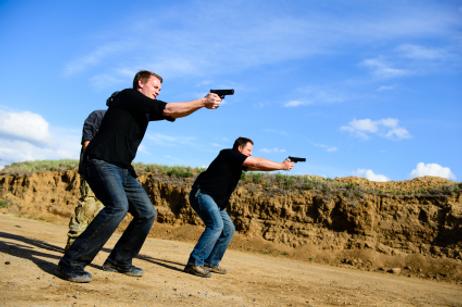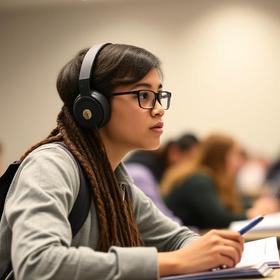In the last decade, college campuses have become the crime scene for too many violent shootings. From the University of Arkansas and Virginia’s Appalachian School of Law to Arizona Nursing College and Virginia Tech, dozens of students, professors, and deans have been killed or wounded by gunmen. In the last five years, 35% of American college campuses have experienced at least one gun incident, according to the Brady Campaign to Prevent Gun Violence. The violence on campus has sparked a rigorous debate: should instructors and professors be allowed to carry guns on campus? Currently, 13 state legislatures are reviewing bills that would permit concealed weapons on campus.
This video from WJZ television in Baltimore reports on the issue of staff carrying guns on campus.
The Current Law
The Gun-Free School Zones Act of 1990 currently makes it illegal for anyone to carry a gun in a school zone, which is on campus or within 1000 feet of a school. State legislators reviewing pro-gun laws are considering revoking gun-free school zones, allowing permit holders to bring firearms onto campus. Proponents rhetorically argue, “Why can’t people protect themselves on campus, just like they do throughout the state?”
Proponents of Concealed Weapons on Campus
The supporters of the proposed legislation argue that allowing instructors to carry concealed weapons would keep campuses safer, giving the potential victims an ability to defend themselves against shooters.
Right-to-Carry Laws Decrease Violent Attacks
Proponents argue that allowing concealed carry on campus prompts would-be attackers to think twice about shooting, thus decreasing the probability of a violent attack.
According to economist Dr. John Lott in his book More Guns, Less Crime, and the Bias Against Guns, allowing authorized individuals to carry guns may make campuses safer for everyone. To support his argument, Lott analyzes the data on states that allow right-to-carry laws. Between the years 1977 to 1999, the states that passed handgun right-to-carry laws witnessed a 60% decrease in violent attack rates, as well as a 78% reduction in the fatalities that occur from such attacks.
Limited Campus Shootings Before “Gun-Free” Zones
Before 1995, teachers in many states did have the ability to bring guns to campuses. According to Lott, the increase in student shootings started after the ban on guns was implemented. Further supporting this fact via Digital Survivors, Superintendent David Thweatt of Harrold Independent School District, the only district that currently allows its teachers to bring concealed firearms to campus, argues, “When the federal government started making schools gun-free zones, that’s when all of these shootings started. Why would you put it out there that a group of people can’t defend themselves?”
This video from Fox News reports on handguns being allowed on Texas college campuses.
Instructors with Guns Make Campuses Safer and Provide First Line of Defense
In Arizona, the state legislature is currently debating Bill SB1011, which would repeal gun-free zones around campuses and allow college instructors to carry concealed firearms as the first line of defense. Senator Jack Harper, the originator of the bill, argues that instructors with guns would keep campuses safer, stating, “Those that would come into an area known as a defense-free zone should have to think twice about doing harm to innocent life.” According to Harper, as quoted in the East Valley Tribune, “If they know that a law-abiding citizen can carry their firearm concealed, as guaranteed by the Constitution…they’re going to think twice about doing harm to someone.”
Opponents Against Concealed Carry on Campus
On the other side of the issue are staunch opponents, who believe that measures to allow concealed weapons in school do not address the fundamental issue of campus shootings.
Concealed Guns Do Not Make Campuses Safer
According to a study that interviewed 600 campus police chiefs across America, 85% of the respondents did not believe that allowing instructors to carry guns on campus would prevent campus killings. As published in the Journal of American College Health, only 5% of the campus police chiefs believed that the measure would improve safety.
Other opponents of the legislation believe that professors and instructors are not equipped to be the first line of defense against gunmen. In an interview on “The O’Reilly Factor,” Dr. Marc Lamont Hill, a professor from Temple University, argued, “You’re expecting a professor to defend 200 students from a crazed gunman who perhaps knows what he’s doing. That’s very dangerous…and it’s unlikely that a professor with a gun would be able to prevent or cut down a person like that.”
In many states, an individual can receive a permit to carry a concealed weapon, even without undergoing target practice. In addition, even trained police officers only hit their targets 20% of the time, according to the Brady Campaign.
Allowing Guns on Campus is an Extreme and Ineffective Measure
If professors and instructors are allowed to carry concealed guns, this creates a scenario of uncertainty should a mass shooting arise. When the police arrive on the scene, it will be difficult for them to discern who is the perpetrator, which could lead to more injuries and deaths.
In addition, opponents argue that allowing guns on campus do not address the fundamental issues of mass campus shootings. Rather than equipping more people with guns, it is important that schools identify troubled students and actively counsel or manage the issues – before they turn into mass shooters. According to E. Floyd Phelps, the chairman of the Fire and Life Safety Council for ASIS International in a FacilitiesNet article, “You need to look at people and try to help them.”
This report from CBS television in Dallas, Texas, reports on the "Campus Carry" law being extended to college campuses.
Legislation Would Lead to Even More Guns on Campus
John Thomas, a lobbyist for the Arizona Association of Chiefs of Police, argues that allowing instructors to carry guns would only lead to more firearms on campus. “If you allow faculty this year, next year will be staff, next year will be the students.”
The debate surrounding concealed carry on campus is certainly controversial, and one that does not appear to be waning any time soon. While the sides are clearly divided on the firearm issue, one fact remains certain: something must be done to make our campuses safer.
Questions? Contact us on Facebook. @communitycollegereview












